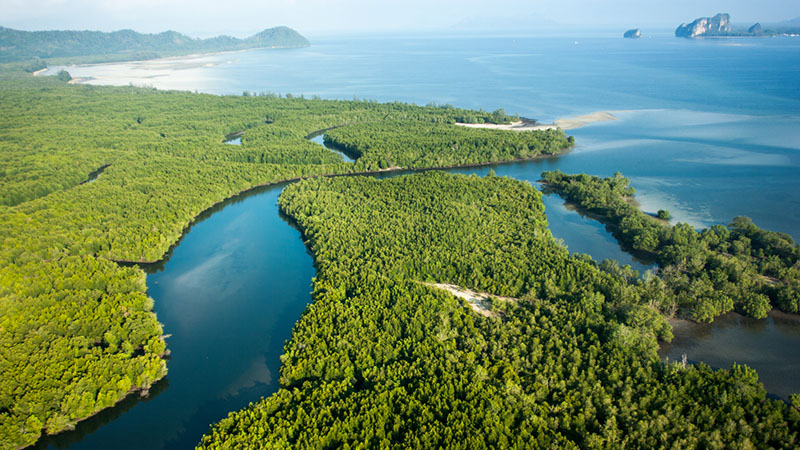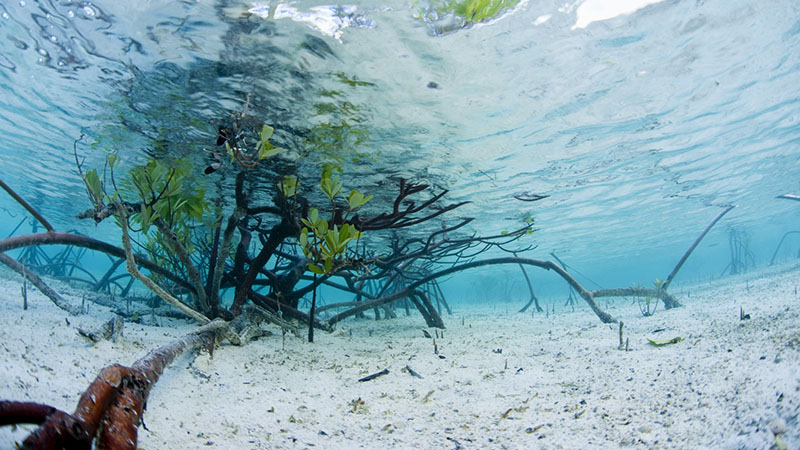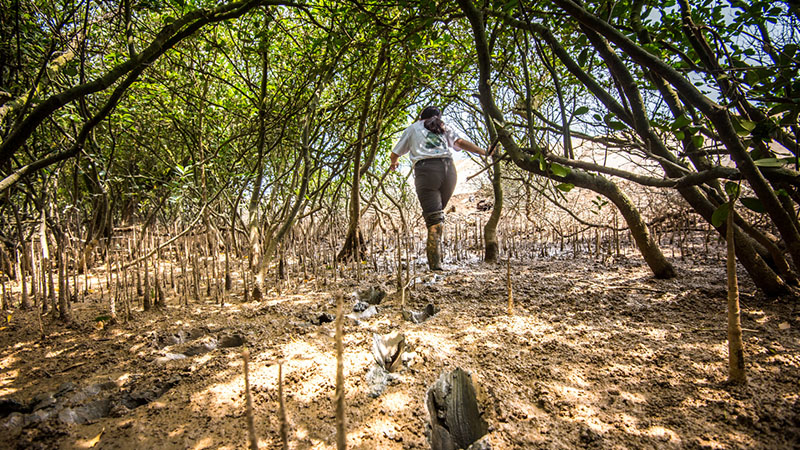There might not be much of them, and you might not see them often, but Hong Kong’s mangroves constitute one of our most important ecological habitats. Unfortunately, this miracle plant is under threat, not just here but all around the world – and that spells bad news for our fight against climate change.
Why mangroves matter
“Blue carbon” ecosystems such as mangroves, tidal marshes and seagrasses sequester and store large quantities of carbon. This is in both the biomass of the plants themselves, as well as in the sediments they secure below water.
“The root systems of coastal mangroves secure large quantities of rich sediment,” says ROBERT BAIGRIE, who is the senior director of partnerships and conservation finance at Conservation International (CI). “Some of these ecosystems can hold up to ten times more carbon than a terrestrial forest. Ten times!”
When we lose mangroves to coastal development, the carbon they’ve stored for centuries is released into the air and becomes a source of large quantities of greenhouse gases. Experts estimate that as much as 1.02 billion tons of carbon dioxide are being released annually from degraded coastal ecosystems. That’s equivalent to almost a fifth of all emissions from tropical deforestation globally! Wow.
So, where are the mangroves going? Urban development, along with agriculture and aquaculture (shrimp ponds, for example) are primarily to blame for the loss of these ecosystems. And it’s a widespread problem – more than 100 countries have mangrove forests along their coastlines. Hong Kong is among them, with 350 hectares of mangroves dotted across 40 forests – a modest amount, yet still the largest within the Pearl River Delta. The biggest mangrove coverage in the world can be found in Indonesia, where the trees cover some 23,000 square kilometres – that’s more 20 times the size of Hong Kong.
Mangroves are found on every continent except Antarctica and the story is the same everywhere: they are disappearing at an alarming rate.
More than carbon storage
“The value of mangroves is not just the carbon they store,” says Robert. “Mangroves play a hugely important role on many other levels; which is why it’s so critical to protect them.” Here are just of few of the benefits the plant bestows on the world:
• Biodiversity and food supply. Reef and open ocean fish, corals, octopus, crabs and more are born and grow up in the mangroves before moving out to open sea. Destroying the mangroves destroys our food supply and marine biodiversity.
• Storm protection. Mangroves are the first line of defence from tidal erosion and increasingly powerful storm surges in places such as the Philippines.
• Protection for coral. Mangroves help protect young coral. Healthy mangroves can help rejuvenate coral that has been lost or displaced.
• Support to communities. People, particularly those in developing nations, rely on mangroves as a source of income and medicine. Mangroves also provide wood for fuel and construction
What is Conservation International?
CI is one of the largest environmental organisations in the world, yet it often flies under the radar. It’s a science-based organisation, committed to finding scalable solutions to large and complicated problems. Its work is funded primarily by a relatively small, but very committed, donor-base. This means there’s less need to advertise in a traditional sense, which is why many have never heard of them.
“Conservation International is heavily involved in identifying and harnessing nature-based solutions to the world’s increasingly urgent climate change challenges,” explains Robert. “Nature is one of the most costeffective assets in the fight against climate change.”
Nature can provide at least 30 percent of the action we need to limit global warming. Yet of all the money spent on climate change, only two percent goes to nature-based solutions. CI is working to find ways to help nature protect and repair itself, while also protecting and feeding ourselves.
Over the past 30 years, CI has protected 1.5 billion acres of the world’s most critical land and ocean. It has offices in more than 30 countries and works with more than 2,000 partners across the globe. Working to restore mangroves is only a small part of what Want to check your own carbon footprint? Visit conservation.org/carbon-footprint-calculator. CI does, but it’s an important piece of the puzzle. This is especially true in Southeast Asia where some of the most significant mangroves forests remain, and where the greatest rate of mangrove destruction is happening.
Reducing your own footprint
Expats tend to have particularly large carbon footprints because of the travel we do to our distant homelands. Maybe you’ve just been home for the holidays, and you’re feeling a little guilty about that long plane ride. On top of travel, we also import a lot of our food. And we run air-conditioners to escape extreme seasonal heat. The list of things we each do that are bad for the planet is long indeed. Many of us feel bad about it, but don’t know how to act in response.
CI has a simple way for you to help reduce your own consumption: a carbon footprint calculator. It’s easy to use, too. You just answer a few questions about your home and lifestyle, and it tells you what your carbon footprint is.
It’s not a great feeling realising how much you contribute to the Earth’s problems. The good news is that CI has an easy way for you to minimise your footprint, by making an offset in the form of a simple donation. This offset is then used to help protect carbon-absorbing forests, conserve biodiversity, and help indigenous people build resilience to climate change, sustaining livelihoods that rely on the nature.
Climate change is not an issue of the future. We must adapt now, and we can’t do it without nature – or you. Perhaps you think the problem is too big and that one individual can’t really make a difference. Don’t be fooled. The small differences you make every day are truly the key to the centuries ahead.
Help protect the mangroves
#1 Vacation at environmentally-friendly resorts. Find those that support local communities, protect their surrounding environments and work with local or global conservation organisations.
#2 Participate in a tree planting or beach or mangrove clean-up.
#3 Buy ecologically-responsible products.
#4 Offset your carbon footprint with Conservation International.
Want to check your own carbon footprint? Visit conservation.org/carbon-footprint-calculator.
Like this? Read more in our Living in Hong Kong section:
Flexible apartment options with facilities and views
Saying goodbye to beloved Hong Kong
Expat guide to where to live in Hong Kong








